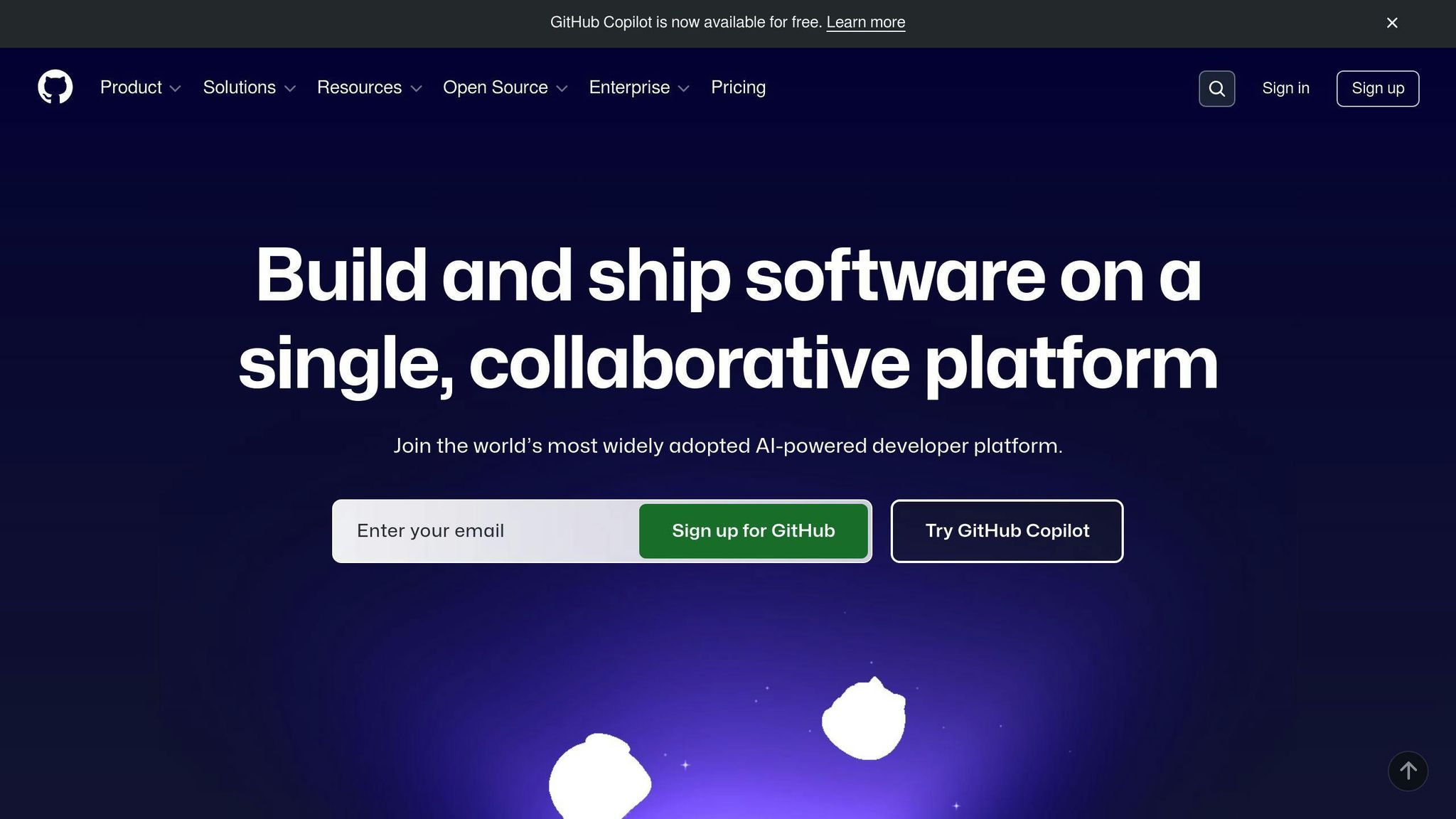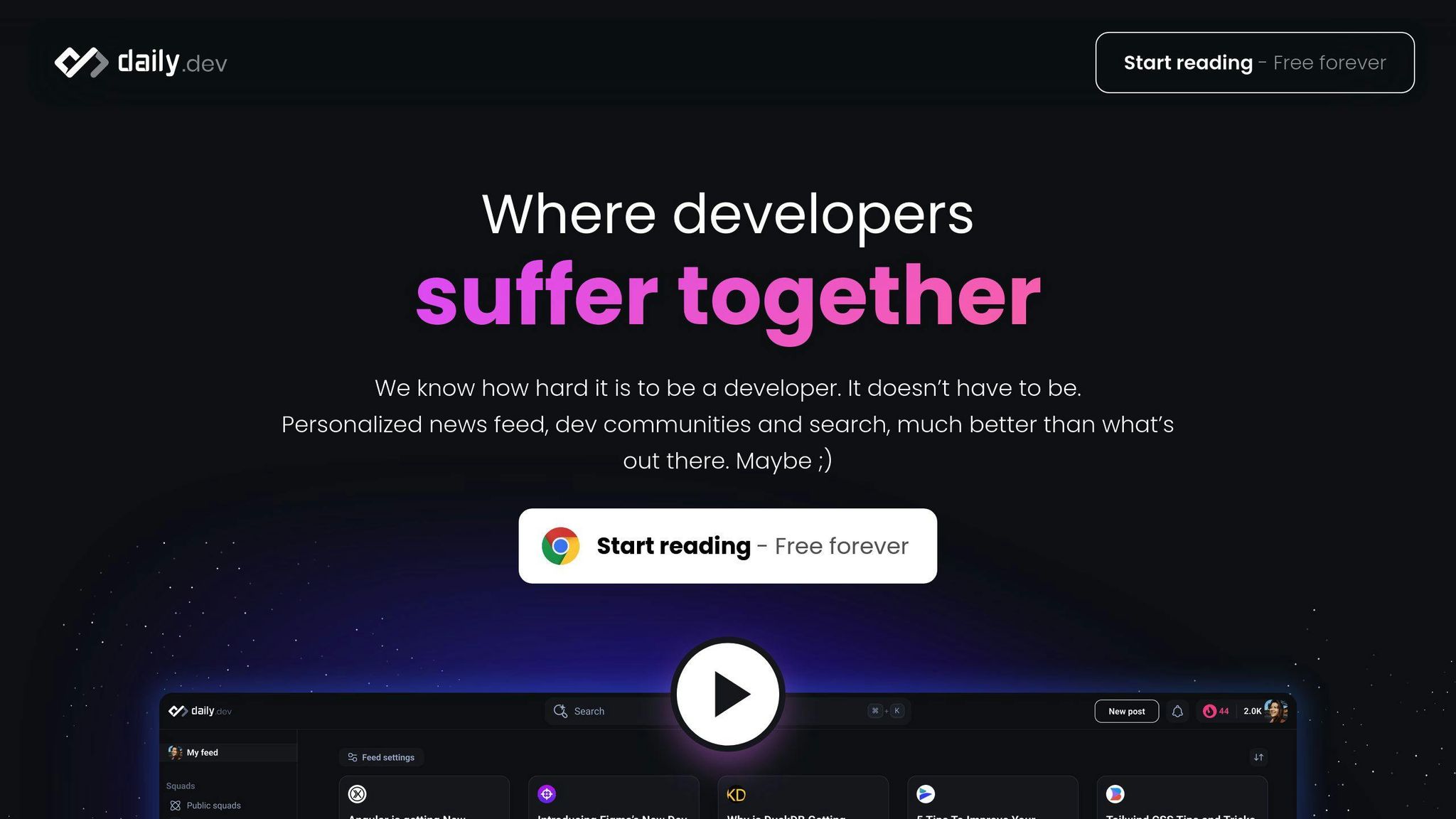


Learn how to build a strong developer brand by showcasing your skills, engaging with communities, and sharing valuable content.
Building a developer brand is about showcasing your skills, sharing knowledge, and connecting with others in the tech community. Here's how to get started:
- Focus on Your Strengths: Identify your technical skills and decide on a niche or area of expertise.
- Create a Mission Statement: Clearly define what you do and how you help others. For example, "I optimize web apps for speed and accessibility."
- Be Consistent: Use the same profile picture, messaging, and style across platforms to build recognition.
- Leverage Platforms: Showcase your work on GitHub, improve your LinkedIn profile, and engage with developers on Twitter, Stack Overflow, or Reddit.
- Share Content: Write blogs, contribute to open-source projects, or speak at events to share your expertise and help others.
Quick Tip: Start small - pick one platform, one topic, and one way to share your knowledge. Consistency and authenticity are key to building trust and standing out in the developer community.
Related video from YouTube
How to Build Your Developer Brand
Want to stand out in the crowded developer space? Let's look at how to build a personal brand that gets you noticed - without trying to please everyone.
Identify Your Skills and Focus Area
Here's the thing: You can't (and shouldn't) try to master everything. Pick what you're good at and what gets you excited. Maybe you're into making React apps lightning-fast, or you love making websites work for everyone through accessibility.
Think about who you want to reach. Are they startup founders? Other developers? Junior coders looking to level up? Know your audience, and you'll know what to offer them.
Here's a simple way to map out where you stand:
| Skill Level | Technical Skills | Community Involvement |
|---|---|---|
| Expert | Primary programming languages | Open source contributions |
| Proficient | Frameworks & tools | Technical writing |
| Learning | New technologies | Public speaking |
Write a Personal Mission Statement
Think of your mission statement as your elevator pitch. Keep it short and clear. Instead of saying "I'm a full-stack developer", try something like: "I help startups build web apps that can handle massive growth, using modern JavaScript frameworks."
Focus on the problems you fix and how you're different from others. What's your special sauce? Maybe you're the person who makes complex performance issues simple to understand.
Keep Your Brand Consistent
Ever notice how you can spot an Apple product from a mile away? That's brand consistency. Apply the same idea to your professional presence:
- Pick ONE good headshot and use it everywhere
- Stick to your message about what you do best
- Create content that matches your expertise
"Consistency is key in building trust and credibility."
Pro tip: Pick 2-3 colors you'll use in your visuals and decide on your writing style. Are you more "Hey folks!" or "Dear colleagues"? Choose what feels natural to you and stick with it.
Best Platforms to Promote Your Developer Brand
Ready to get your brand out there? Let's look at the platforms that'll give you the most bang for your buck.
Use GitHub to Showcase Your Work

Make GitHub your coding portfolio's home base. Create an eye-catching profile README and pin your standout projects where everyone can see them. Think of your GitHub profile as your coding resume - your README, pinned repos, and those little green contribution squares tell the story of who you are as a developer.
Improve Your LinkedIn Profile
Here's something you might not know: 70% of LinkedIn users are outside the U.S. That's a LOT of global reach! Make your profile pop by ditching the boring job title headline. Instead, tell people what you're great at - maybe you're a "Backend Developer Who Makes APIs Sing" or a "Mobile Dev Creating Apps People Love."
Don't forget to show off your GitHub projects as featured items. Add your tech certifications and spice up your feed with code snippets that show what you're learning or building.
Engage on Twitter and Join Developer Communities
Twitter isn't a numbers game - it's where real connections happen. Share your coding adventures through tweet threads, or show off your latest project with a GitHub link.
Stack Overflow and Reddit's programming communities are gold mines for developers. When you help solve problems on Stack Overflow, people start seeing you as the expert you are. Jump into Reddit discussions to stay in the loop and share what you know.
"Personal branding isn't about self-promotion - it's about consistently sharing knowledge and helping others in the developer community."
Now that you've got your platforms set up, it's time to fill them with content that makes people take notice.
sbb-itb-bfaad5b
Share Content to Build Your Reputation
Want to make a name for yourself in the developer world? Here's the thing: having social profiles isn't enough. You need to share your knowledge in ways that actually help other developers grow.
Start a Blog to Share Technical Knowledge
Skip the theory-heavy posts - focus on real problems developers face every day. Platforms like Dev.to and Hashnode come with built-in developer audiences, perfect for connecting with other coders.
Here's what works: Write about specific problems you've solved. Instead of generic topics like "How to Use React", go for something like "How I Fixed Memory Leaks in a React Native App - With Real Examples."
Make your posts hands-on and practical:
- Show your actual code snippets
- Walk through your debugging process
- Share before-and-after performance stats
Pro tip: The magic often happens in the comments. Jump in, answer questions, and keep the conversation going.
Contribute to Open-Source Projects
Open source is your ticket to working with developers worldwide. Start small - look for repositories with "good first issue" tags. These are perfect for newcomers.
Focus on making meaningful contributions:
- Fix bugs in tools you use daily
- Improve documentation where it's unclear
- Create small, focused tools that solve specific problems
Remember: One well-thought-out pull request beats ten tiny fixes. When you submit changes, explain your thinking clearly and be ready to discuss your approach during code reviews.
Speak at Events or Meetups
Nervous about public speaking? Start small with lightning talks at local meetups. Pick a topic you know inside and out - like that tricky bug you squashed last month or the tool you built to speed up your workflow.
Tell stories about your real-world experiences. When you share actual problems and solutions, you'll connect with your audience naturally. Can't find local events? Try platforms like Codementor, where you can host online workshops and share your expertise with developers worldwide.
Tools to Help Build Your Developer Brand
Let's look at some practical tools that can make building your developer presence much easier and more effective.
Grow Your Network with daily.dev

daily.dev helps you build your developer presence while staying on top of tech news. It uses smart AI to feed you technical content that matches your interests, making it easy to join discussions and show what you know.
Want to make it part of your daily routine? Their browser extensions for Chrome, Firefox, and Edge turn every new tab into your personal tech news hub. You'll get fresh content and can jump into discussions without breaking your coding flow.
Track Your Progress with Analytics Tools
Building a strong developer brand isn't just about putting content out there - you need to know what works. Google Analytics shows you exactly how people interact with your content.
Key numbers to watch:
- How many people read your content
- How long they stick around
- How often they share your posts
Here's a pro tip: If you notice your debugging guides are getting lots of attention, that's your signal to create more problem-solving content. People love practical solutions!
And don't forget about LinkedIn - 77% of recruiters use it to hunt for talent. Use what you learn from your analytics to fine-tune your LinkedIn presence and catch their eye.
Conclusion: Start Building Your Brand Today
Want to build a strong developer brand? It's simpler than you might think. The secret lies in being yourself while helping others solve real problems.
Here's what really matters: Focus on sharing your technical know-how, connecting with other developers, and consistently helping the community. Whether you're sharing code snippets on daily.dev or tracking your impact through analytics, what counts is making a real difference in other developers' lives.
Think of your developer brand as a three-legged stool:
- Your technical skills shown through actual work
- Real connections with other developers
- Regular sharing of helpful content (like tutorials or open-source code)
Ready to start? Keep it simple. Pick ONE platform that feels natural to you. Love writing? Start a technical blog. More of a coder? Jump into open-source projects on GitHub. The key is to pick what you're good at and stick with it.
Here's your game plan:
- Pick a tech topic you know inside and out
- Choose where you'll share your knowledge (blog, GitHub, etc.)
- Block out specific times each week for brand building
Building your brand isn't a race - it's more like tending a garden. Keep sharing helpful content, whether it's practical tutorials or useful tools. As you help others grow, your reputation in the developer community will naturally follow.
FAQs
How do I start a coding portfolio?
Want to make your coding skills shine? Here's how to build a portfolio that gets noticed:
Start with a punchy intro that shows what makes you tick as a developer - maybe you're a React wizard or love building with Vue.js.
Pick 3-4 of your knockout projects. For each one, tell the story:
- What problem did you solve?
- Which tech tools did you use?
- What was your role?
- Where can people see it in action?
Here's a secret: Add personal projects that show you code because you love it, not just because someone's paying you. Think open-source work, hackathon wins, or that coding blog you've been working on.
Make your portfolio site clean and snappy - it should work perfectly on phones and desktops. Your GitHub activity graph can show you're always pushing code.
Quick tip: Match your portfolio to your target. Building for startups? Show off quick, smart solutions. Eyeing big tech? Focus on projects that can scale.
Drop some analytics on your site to see which projects catch eyes. When new projects come along, swap out the old stuff to keep things fresh.
Don't forget the basics: make it dead simple for people to reach you and check out your LinkedIn or Twitter.
Think of your portfolio as your coding highlight reel - keep it current, keep it sharp, and let your best work do the talking.

.png)








